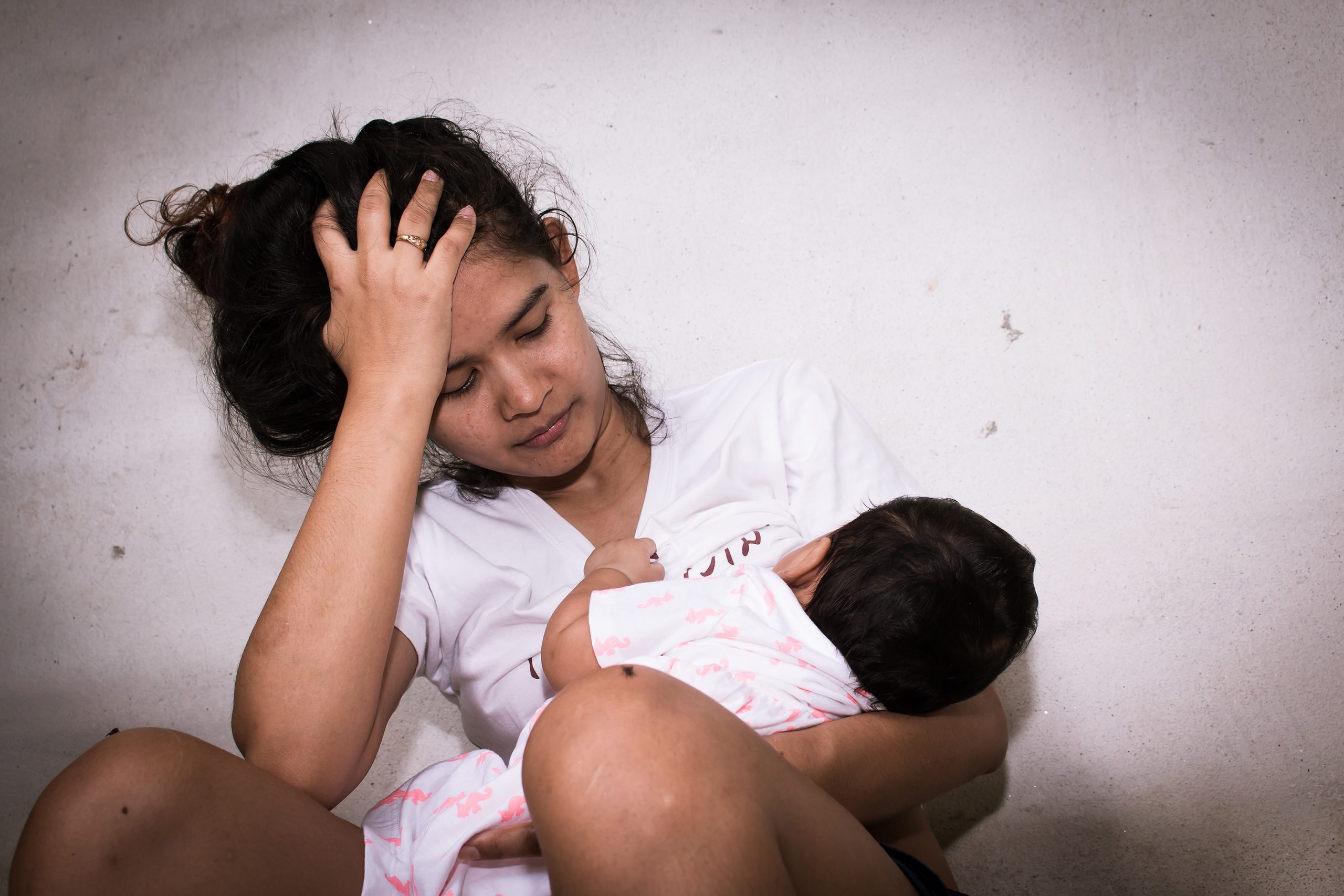With the advances in nutrition and fluid replacements, most women survive hyperemesis gravidarum (HG) with few life-threatening complications. However, the stress, pain, and helplessness of HG cause persistent psychological distress for many women.
PTSS is common following HG pregnancies and is associated with negative life outcomes including inability to breastfeed, marital problems, financial problems, and inability of self-care.
Source: Posttraumatic stress symptoms following pregnancy complicated by hyperemesis gravidarum. -- The Journal of Maternal-Fetal and Neonatal Medicine, 2011.

Trauma after HG
Just like with any trauma, the severity of impact depends on how the individual person experiences HG and any prior history of trauma. This is why preventative care, such as accurate education and support, can make the difference between a patient (or caregiver) resolving and integrating their traumatic experience or developing PTSD (or Complex PTSD) that affects them for months, decades, or even a lifetime. One HG pregnancy might be resolved, but a subsequent pregnancy may lead to PTSD depending on innumerable personal factors.
Risk Factors For PTSD Due to Hyperemesis Gravidarum
People with prior hyperemesis pregnancies are at greater risk for PTSD (Posttraumatic Stress Disorder). Having a potentially life-threatening disease can be overwhelming, and many experiences and feelings increase their traumatic response:
- not being believed by health professionals,
- feeling helpless and debilitated,
- relentless nausea and vomiting,
- feeling overwhelmed and unable to cope,
- invasive, painful, or risky treatment for hyperemesis,
- terminating a wanted pregnancy in desperation,
- lacking support and treatment to get needed relief,
- and living with unexpected and uncontrolled threats to one's body and life (and one's unborn child).
They also experience extreme fatigue, muscle weakness, and distress from incessant nausea and/or vomiting. The sensation of suffocation that accompanies forceful, unrelenting retching or vomiting can be quite traumatic. In fact, inducing that sensation is a torture technique documented to cause psychological trauma. HG women also may be faced with guilt as they consider terminating to end the misery.
Psychosocial Stress
Relationships and finances are strained, and sometimes devastated, and these mothers may feel misunderstood and alone. They may be in the hospital for a few days or weeks, leading to feelings of frustration, isolation and loss of control. They may be unable to care for themselves or their family for weeks or months. These experiences may lead to feelings of helplessness, especially for women with inadequate social support, prior trauma or victimization, or a history of mental illness.
Guilt
Survivors of hyperemesis may struggle with reduced self-esteem, disinterest in intimacy, guilt, and food aversions. Women may also experience anxiety and depression related to suffering due to inadequate treatment for hyperemesis, impact on newborn and bonding, guilt over burden on family, residual effects of pregnancy complications, and fear of hyperemesis recurring in future pregnancies or altering family plans.
Over half of hyperemesis survivors experience trauma-related symptoms, such as avoidance, numbing, hypervigilance, re-experiencing HG sensations, and being easily triggered by distressful reminders of HG. Nearly 20% experience full criteria Posttraumatic Stress Disorder.
Source: Posttraumatic stress symptoms following pregnancy complicated by hyperemesis gravidarum. -- The Journal of Maternal-Fetal and Neonatal Medicine, 2011.
Critical Factors
The most critical factors in determining which women develop PTSD due to hyperemesis gravidarum seem to be the severity and duration of the symptoms.
- suddenness of symptom onset
- severity of symptoms
- level of threat to her or her unborn child's life and health
- responsiveness of medical team
- level of support by significant others
Prevalence
Nearly 20% of women with HG will have PTSD and many more will have symptoms of trauma but not full criteria PTSD. It is common for women to seek answers about HG and be quite emotional discussing or thinking about their pregnancy for many years afterwards.
Diagnosis
Diagnosing PTSD can be difficult since many symptoms are similar to other psychiatric problems. For example, irritability, poor concentration, increased defensiveness, excessive fear, and disturbed sleep are symptoms of both PTSD and anxiety disorder. Some symptoms such as loss of interest, a sense of hopelessness, avoidance of other people, and sleep problems may indicate the woman has PTSD or postpartum depression. Even without PTSD or other problems, experiencing symptoms of HG will impact anyone profoundly, but especially those also responsible for their unborn child.
Factors That May Increase The Risk Of PTSD After Hyperemesis Gravidarum

Assessment
Women with hyperemesis should be assessed for signs of anxiety and depression during pregnancy and after delivery. At the same time, she should be evaluated for signs of PTSD. This is especially true in women with a history of hyperemesis and/or other traumas. Future pregnancies may trigger a return of PTSD symptoms.
Family Support
Family members should also be educated on signs to watch for to ensure these women get the help they need. Symptoms of PTSD usually begin within the first 3 months after delivery, but sometimes they may not appear for months afterwards. Therefore, hyperemesis survivors should be monitored and evaluated periodically.
Early Symptoms
Women may show symptoms soon after pregnancy without meeting the full diagnosis of PTSD. Early symptoms indicate the need for repeated and long-term follow-up of survivors and their families.
Treatment
The chronic and sometimes disabling effects of PTSD mean the disorder needs to be identified and treated quickly. However, the avoidant symptoms that appear with PTSD often keep the woman from seeking help. Signs of postpartum depression combined with postpartum hormone changes and fatigue may make an accurate diagnosis challenging. Health professionals may be quick to treat the depression since she has recently been pregnant and fail to assess further and accurately identify PTSD.
Therapies and Social Support
Therapies used are those used for other trauma victims and involve more than one type of therapy. EMDR and Brainspotting have been reported to help reduce symptoms in some women. Support groups may also help people who experience post-traumatic stress symptoms. It may be difficult to find a local group of women who have experienced hyperemesis. However, there are several online support groups that are supportive. Some mental health professionals specialize in women's health and may be most experienced in working with women suffering from complications of pregnancy.
Offsite Information
The Aetiology of Post-Traumatic Stress Following Childbirth: A Meta-Analysis and Theoretical Framework.
Ayers S, Bond R, Bertullies S, Wijma K. Psychol Med. 2016 Apr;46(6):1121-34.
There is evidence that 3.17% of women report post-traumatic stress disorder (PTSD) after childbirth. This meta-analysis synthesizes research on vulnerability and risk factors for birth-related PTSD and refines a diathesis-stress model of its aetiology. Pre-birth vulnerability factors most strongly associated with PTSD were depression in pregnancy, fear of childbirth, poor health or complications in pregnancy, and a history of PTSD and counselling for pregnancy or birth. Risk factors in birth most strongly associated with PTSD were negative subjective birth experiences, having an operative birth (assisted vaginal or caesarean, lack of support and dissociation. After birth, PTSD was associated with poor coping and stress, and was highly co-morbid with depression.

